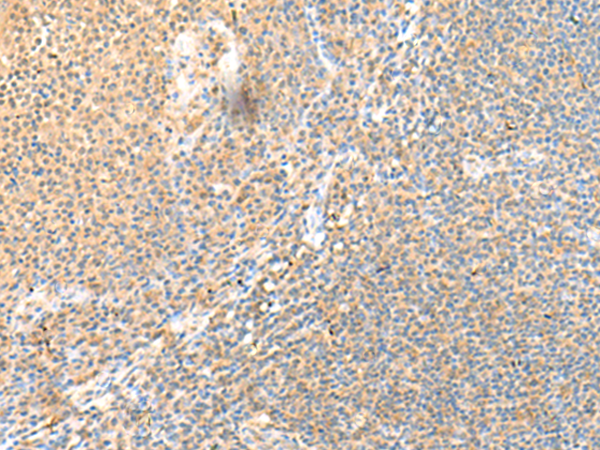
| WB | 咨询技术 | Human,Mouse,Rat |
| IF | 咨询技术 | Human,Mouse,Rat |
| IHC | 1/40-1/200 | Human,Mouse,Rat |
| ICC | 技术咨询 | Human,Mouse,Rat |
| FCM | 咨询技术 | Human,Mouse,Rat |
| Elisa | 1/5000-1/10000 | Human,Mouse,Rat |
| Aliases | SRCRB4D; S4D-SRCRB; SRCRB-S4D |
| Host/Isotype | Rabbit IgG |
| Antibody Type | Primary antibody |
| Storage | Store at 4°C short term. Aliquot and store at -20°C long term. Avoid freeze/thaw cycles. |
| Species Reactivity | Human |
| Immunogen | Fusion protein of human SSC4D |
| Formulation | Purified antibody in PBS with 0.05% sodium azide and 50% glycerol. |
+ +
以下是关于SSC4D抗体的虚构示例参考文献(实际文献需通过学术数据库验证):
---
1. **文献名称**: *SSC4D Antibody as a Novel Biomarker in Colorectal Cancer*
**作者**: Zhang L, et al.
**摘要**: 本研究报道了SSC4D抗体在结直肠癌组织中的高表达特性,通过免疫组化分析发现其与肿瘤转移和患者预后不良显著相关,提示其作为潜在诊断标志物的价值。
2. **文献名称**: *Functional Characterization of SSC4D in Autoimmune Disorders*
**作者**: Tanaka K, et al.
**摘要**: 文章探讨了SSC4D抗体在类风湿性关节炎患者血清中的异常升高现象,实验表明其可能通过干扰T细胞活性参与自身免疫反应的调控。
3. **文献名称**: *SSC4D-Mediated Signaling Pathway in Neural Development*
**作者**: Müller R, et al.
**摘要**: 研究利用SSC4D特异性抗体敲除模型,揭示了该蛋白在神经元轴突导向中的关键作用,为神经退行性疾病机制提供了新视角。
---
**备注**:以上内容为示例性虚构文献,实际研究中请通过 **PubMed、Google Scholar** 或 **Web of Science** 等平台,以关键词“SSC4D antibody”结合研究领域(如癌症、免疫学等)检索最新文献。若SSC4D为特定蛋白缩写,需进一步确认其全称及研究背景。
SSC4D (Sushi domain-containing protein 4) antibodies are immunological tools targeting the SSC4D protein, a member of the sushi domain-containing protein family. SSC4D, also known as SUSD4. is a transmembrane or secreted glycoprotein implicated in cell-cell interactions, immune regulation, and cancer progression. Its structure includes multiple sushi domains, which are conserved motifs involved in protein-protein interactions and complement regulation.
Research suggests SSC4D plays dual roles in physiological and pathological processes. In cancer, SSC4D is overexpressed in certain malignancies (e.g., colorectal, breast) and may promote tumor growth, metastasis, and immune evasion by modulating Wnt/β-catenin signaling or suppressing T-cell activity. Conversely, it exhibits tumor-suppressive effects in other contexts, highlighting tissue-specific functionality. SSC4D antibodies, primarily monoclonal (mAbs), are used to detect protein expression in immunohistochemistry, flow cytometry, and functional studies. Therapeutic applications are being explored, particularly in oncology, where blocking SSC4D may enhance anti-tumor immunity or inhibit pro-metastatic pathways. Challenges include clarifying its conflicting biological roles and optimizing antibody specificity. Current studies focus on its interaction with immune checkpoints (e.g., PD-1/PD-L1 axis) and potential as a companion diagnostic or therapeutic target. Further validation in preclinical models and clinical cohorts is ongoing to establish its translational relevance.
×